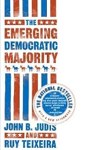Professional
In The Emerging Democratic Majority
, Teixeira and Judis argue that a key Democratic constituency moving forward will be professionals. Doctors, lawyers, and professors used to vote Republican. They're now overwhelmingly Democratic.
This is important to American politics, and it explains one of the vast (if quiet) changes we’ve seen recently. Suburbs used to be Republican strongholds, red rings that surrounded blue cities. It’s not true anymore, because the suburbs are filled with new professionals, often following new professions. Computer programmers, tech writers, industrial designers, analysts, artists, actors, architects, Web developers. They've all got something in common.
But what, exactly? The old answer was, they all had jobs where they could keep their hands clean all day. But that’s not quite right, and it doesn’t explain why they’re progressives. Another old answer was that they were independent, either self-employed or able to switch jobs whenever they felt like it. But that’s not right either — and it’s not really true anymore.
Teixeira and Judis offer an intriguing new definition: to them, “professionals” are people who are chiefly motivated to create great things or great ideas. This contrasts to the assembly-line worker, motivated to get the best deal in exchanging time for money. It contrasts, too, with managers and entrepreneurs who are motivated chiefly by performance.
It’s a handy division. Michael Ruhlman, for example, has often explored the question: “Is cooking an art? Is a chef a craftsman, a business executive, a performer, or a salesman?” Obviously, all are true some of the time, for some people. The Teixeira/Judis definition is really handy here: the line between chef-professional and chef-manager is the line between cook and shoemaker, the line between the obsessive (It’s not right; do it over. The patron will wait.) and the pragmatist (time’s up, good enough, get it out of my face).
